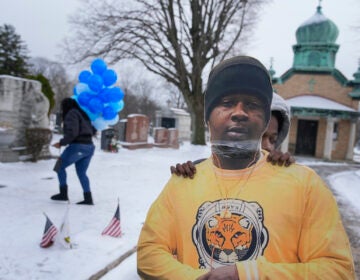N.J. bill calls for treatment over jail time for criminal defendants with mental illness
Criminal justice advocates say correctional facilities are typically not equipped to provide adequate mental health care.

(Steve Ruark/AP Photo, file)
A bill set to be introduced in the N.J. Legislature this week would allow police officers to refer less serious criminal defendants with mental disorders to treatment instead of court or jail in an attempt to reduce the number of inmates experiencing mental illness.
Prisons and jails are “not oriented toward treatment,” said Dominic Sisti, assistant professor of medical ethics and health policy at the University of Pennsylvania. “They are often somewhat chaotic, violent places where individuals with serious mental illness may even get worse.”
A Bureau of Justice Statistics study from 2017 found that inmates had higher rates of “serious psychological distress” than the general population, with 26 percent of males and 32 percent of females in local jails reporting some form of mental illness. Criminal justice advocates say correctional facilities are typically not equipped to provide adequate care.
State Sen. Shirley Turner, D-Mercer, is introducing legislation aimed at cutting down on the number of mentally ill people who end up behind bars. Turner’s idea is to divert people before they even set foot in jail or prison.
According to a draft of the bill shared with WHYY, the state’s Police Training Commission would conduct mandatory courses to help uniformed law enforcement officers recognize the signs of mental illness. A subset of those officers would also receive specialized crisis-intervention training.
Police officers who suspect a defendant was mentally ill would be able to refer that individual for screening. Once health care professionals determine a mental illness, police agencies would be able to divert a defendant away from court and into treatment programs or other services, in coordination with the state Department of Health. Even in cases where police officers file charges against a defendant, the prosecutor in the case would still be able to divert the defendant to treatment, so long as a judge approved.
The most violent offenders would be ineligible for diversion, and law enforcement officials would be advised against (but not barred from) diverting people accused of first- and second-degree crimes and domestic violence offenses. The prosecutor would have to consult with the victim before sending a defendant to treatment.
Defendants would not have to plead guilty to enter the program.
Any defendants who “failed to comply” with their mental health treatment plans could have charges filed against them; conversely, prosecutors could drop any charges against people who successfully completed their care plans.
“The majority of these people are just being warehoused in our institutions, which is not really productive, nor is it humane,” said Turner. “I’m hoping that we can treat people for their mental health issues and their illnesses rather than incarcerate them.”
Turner estimated that, in the long run, the costs of training police and diverting people to mental health treatment services would be lower than keeping them behind bars.
The program outlined in Turner’s draft legislation resembles “mental health courts” already operating in Pennsylvania and other states where officials have acknowledged that traditional court processes disadvantage the mentally ill. Instead those officials have set up a separate track for people experiencing mental illness that emphasizes treatment and supervision over incarceration and punishment.
But Sisti, the Penn professor, said many solutions to the mental health crisis in jails and prisons are temporary. While he applauded the New Jersey proposal and other efforts to provide adequate mental health care in correctional facilities, he said truly reforming mental health care would take a radical rethinking of the whole system.
“These interventions, these processes — whether it’s a mental health court or what you’re describing in New Jersey — these are all good steps, but they’re stopgaps. They’re not going to change things fundamentally.”
WHYY is your source for fact-based, in-depth journalism and information. As a nonprofit organization, we rely on financial support from readers like you. Please give today.




